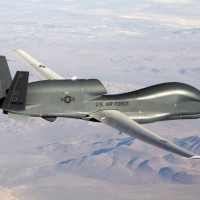The United States is shutting down its drone operations in southern Ethiopia as demands on its fleet of unmanned aircraft expand elsewhere across the continent with the rise of Daesh in Libya, and extremist militants in Nigeria, Mali, Chad and Cameroon.

Since 2011, the US had been using the airbase in Arba Minch, 250 miles south of the capital, to launch surveillance drones aimed at groups in East Africa with links to Al Qaida. US personnel primarily focused on Al-Shabaab, a Somali group that has waged deadly terrorist attacks across East Africa.
Pentagon officials remained tight-lipped on Monday about the reasons behind the move. Lt. Col. Michelle Baldanza, a Defence Department spokeswoman, said the US and Ethiopia agreed that the continued presence of the drone base was “not required at this time.”
Some experts say the fight against Al-Shabaab was going well enough that the Pentagon’s Africa Command, or Africom, had the opportunity to redistribute its scarce resources elsewhere.
“Al-Shabaab remains virulent, but as a significant terrorist threat with high profile leaders in range for drone attacks, much less so,” said Peter Pham, director of the Atlantic Council’s Africa Centre.
Other groups, by contrast, are rapidly gaining strength — and presenting far more tempting targets for the Pentagon and its drone operators.
In recent months, Daesh, also known as the Islamic State or ISIL, has consolidated its power in Libya, allowing it to easily move into the port city of Sirte, and now control an estimated 150 miles of territory along the country’s Mediterranean coast. Its presence has reportedly forced the US to focus on gathering intelligence there in order to better monitor militant movements in North Africa.
The continued strength of Boko Haram — the extremist group terrorising northeastern Nigeria and parts of Cameroon, Chad, and Niger — has also forced Washington to dedicate more resources in the Lake Chad region as well.









